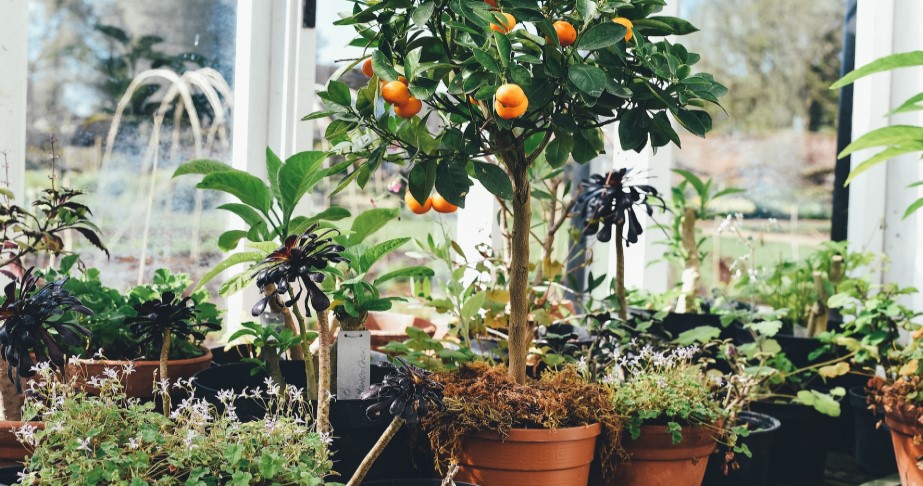Mulching plays a vital role in supporting the health and productivity of potted citrus trees.
As a gardener, you understand the joy and satisfaction that comes from nurturing these vibrant trees, with their glossy leaves and juicy, sun-kissed fruits.
But it’s essential to create an optimal growing environment to ensure they thrive in their confined space.
And that’s where mulch comes in, like a supportive guardian that wraps its nurturing embrace around your citrus trees.
Best Mulches for Citrus Trees in Pots
- Organic mulch options
1. Shredded Bark
Shredded bark mulch is a popular choice among gardeners for mulching citrus trees in pots. It’s readily available, affordable, and offers several benefits.
One of its key advantages is its effectiveness in moisture retention.
The shredded bark acts as a natural sponge, absorbing water and slowly releasing it into the soil.
This helps to maintain consistent soil moisture levels, reducing the frequency of watering and minimizing water stress on the citrus trees.
Shredded bark mulch also provides insulation during temperature fluctuations, protecting the roots from extreme heat or cold.
Over time, the mulch gradually decomposes, adding organic matter to the soil and improving its structure and fertility.
2. Wood Chips
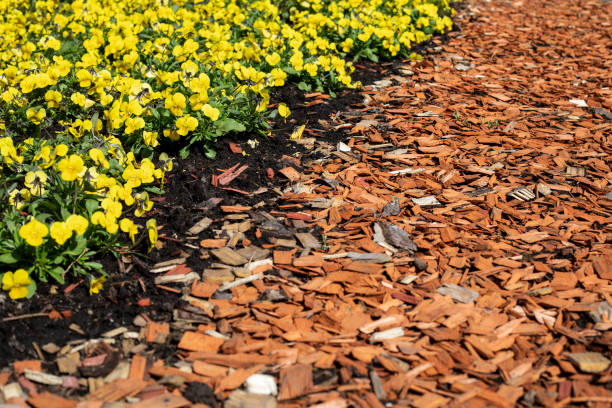
Similar to shredded bark, wood chips have good moisture retention properties and help regulate soil temperature.
They break down slowly, providing a long-lasting mulching solution.
Wood chips also create a protective barrier on the soil surface, preventing weed growth and reducing competition for nutrients and water.
Use well-aged wood chips to avoid nitrogen depletion in the soil, as fresh ones can initially tie up nitrogen during decomposition.
Related: Where to Get Wood Chips for Gardens
3. Straw/Hay
Straw or hay can be used as mulch for potted citrus trees, but it requires caution to prevent fungal growth.
These organic materials help conserve moisture by reducing evaporation from the soil surface.
They also act as a barrier, protecting the soil from extreme temperatures and reducing temperature fluctuations.
However, straw and hay can create a favorable environment for fungal growth, so it’s important to apply them in thin layers and ensure good airflow around the citrus tree’s base.
4. Compost
It’s rich in nutrients and helps improve soil fertility.
Applying a layer of well-aged compost around the base of the tree provides a slow-release source of essential nutrients, promoting healthy growth and fruit production.
Compost also aids in retaining soil moisture and improving its structure by enhancing its ability to hold water and nutrients.
5. Pine Bark Mulch
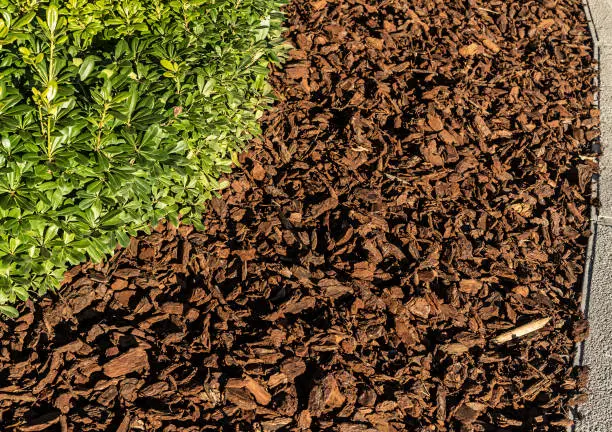
This is derived from the outer layers of pine tree bark.
It’s widely available in garden centers and is a popular choice for various landscaping applications, including mulching citrus trees in pots.
Its benefits include weed suppression and organic matter and soil improvement.
- Inorganic mulch options
6. Gravel/Rocks
They provide good drainage and help prevent soil erosion.
Gravel or rocks can be particularly useful in areas with heavy rainfall or where soil erosion is a concern.
They, however, don’t contribute organic matter to the soil.
And they can absorb and reflect heat in hot climates, potentially raising soil temperatures and impacting the root system of citrus trees.
7. Rubber Mulch
Rubber mulch, made from recycled tires, is an environmentally friendly inorganic mulch option.
It helps retain moisture in the soil and suppresses weed growth.
Rubber mulch also has the advantage of long-lasting durability, as it doesn’t decompose like organic mulch.
However, there are some concerns regarding its long-term effects on soil health and the potential leaching of chemicals from the rubber material.
If using rubber mulch, it’s advisable to monitor the soil conditions and take appropriate steps to maintain soil fertility.
8. Plastic Mulch
This is a specific type of inorganic mulch that can be used for moisture retention in certain scenarios. It creates a barrier against weed growth, reducing competition for nutrients and water.
It also helps maintain consistent soil temperature, which can be beneficial in controlling temperature fluctuations.
However, it can impede water penetration into the soil and restrict airflow to the roots.
Proper irrigation practices and regular monitoring of soil moisture levels are essential when using plastic mulch.
Related: 10 Best Mulches for Wet Areas
Factors to Consider When Choosing Mulch for Citrus Trees in Pots
Consider the following factors to make an informed choice.
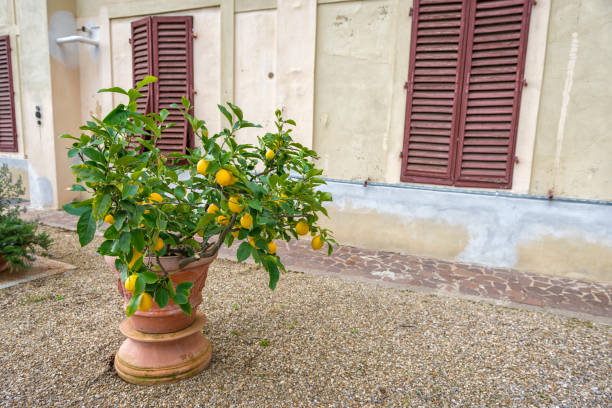
Climate and seasonal considerations
Depending on your climate, select mulch that suits the needs of your potted citrus trees.
In colder regions, opt for mulches that provide insulation and protection against freezing temperatures.
In hot climates, choose mulches that retain moisture and regulate soil temperature.
Water drainage and retention
Assess the drainage capabilities of the mulch options.
Some mulches excel in improving water drainage, and preventing root rot, while others are better at retaining moisture, and keeping the soil consistently moist.
Nutrient requirements
Consider the nutritional needs of your citrus trees and ensure the mulch you choose aligns with those requirements.
Organic mulches like compost can contribute essential nutrients to the soil as they break down over time, promoting healthy growth and fruit production.
Balancing the nutrient needs based on your specific soil conditions and the chosen mulch is crucial for optimal tree health.
Soil pH compatibility
The pH level of your soil is an important factor to consider when choosing mulch.
Citrus trees generally prefer slightly acidic to neutral soil conditions.
Some organic mulches, like pine bark or wood chips, tend to have a slightly acidic pH, which can help maintain the desired soil acidity for citrus trees.
On the other hand, in alkaline soil, mulches with a higher pH, such as straw or hay, can contribute to further alkalinity.
Assess your soil’s pH and select a mulch that aligns with the desired pH range for optimal citrus tree health.
Aesthetics and garden design
While the primary purpose of mulch is to benefit the health of your potted citrus trees, aesthetics and garden design are additional factors to consider.
Mulch can enhance the visual appeal of your garden and contribute to a cohesive and well-designed landscape.
Different mulch materials offer various textures, colors, and appearances.
For instance, shredded bark mulch can provide a natural and rustic look, while gravel or rocks can add a more contemporary or decorative touch.
Consider the overall theme and style of your garden, and choose a mulch that complements the aesthetic vision you have in mind.
Related: Best Mulch for Perennials
Mulching Techniques for Citrus Trees in Pots
Now that you’ve selected the perfect mulch for your potted citrus trees, let’s explore some effective mulching techniques.
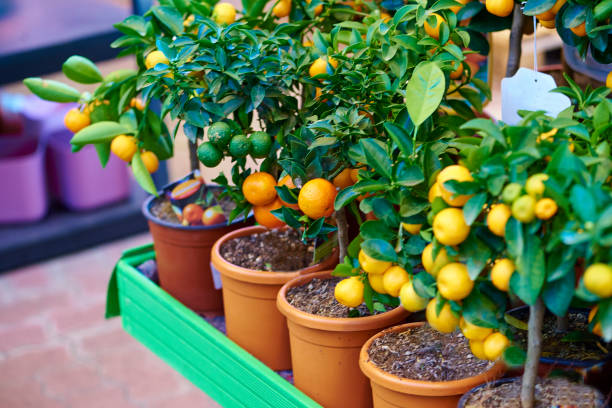
Proper mulch application and thickness
Apply mulch in a layer that’s approximately 2-4 inches thick, ensuring it covers the entire soil surface around the tree.
Avoid piling mulch against the trunk, as this can lead to moisture retention and encourage pests or diseases.
Maintaining a mulch-free area around the trunk
Leave a small gap between the mulch and the trunk to prevent moisture buildup and discourage pests. This also helps the tree’s base stay dry, reducing the risk of fungal diseases.
Renewing mulch periodically
Over time, organic mulch will break down and decompose.
It’s essential to replenish the mulch layer every year or as needed to maintain the desired thickness and benefits.
Remove any old or compacted mulch before adding fresh layers.
Related
- Best Gravels to Walk on Bare Feet
- 10 Best Mulches for Wet Areas
- Top 10 Wholesale Mulch Suppliers
- Grass Mulching Pros and Cons
- Gorilla Hair Mulch Pros and Cons
- Best Mulch for Perennials
- Top 7 Disadvantages of Decomposed Granite
- 5 Best Mulch Options for Pear Trees
